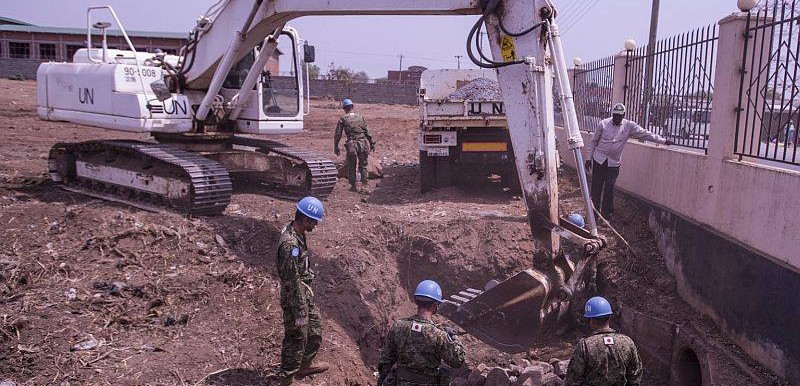Military and civilian personnel of the UN Mission in South Sudan (UNMISS) have recently helped build several schools and other government infrastructure including in the areas of Juba, Bor, Wau, Kuacjok and Torit.
The UN mission reported on its website on 10 March that it handed over two new classrooms to the government of Warrap State. UNMISS said the construction was a “Quick Impact Project.”
“This greatly relieves the government and people of Warrap State from the burden of lack of learning space,” said Adriano Kiir Ayuel, the Director General of the State Ministry of Education, Science and Technology, during a ceremony in Mayen Gumel community.
According to the online news story published by UNMISS, the government structure located at Kuajok Academy Secondary School is valued at $50,000. The government official called the construction a “goodwill gesture.”
Meanwhile in Bor, UNMISS military engineers built a classroom block at Lualdit primary school, according to a Mission newsletter for the period covering February 2015.
In Western Bahr al Ghazal State, the Wau County Commissioner Elia Kamilo Dimo told Radio Tamazuj yesterday that UNMISS funded the construction of a police post at Baggari Payam, valued at $50,000.
Similarly, Rwandan troops serving with the UN Mission in Juba recently “handed over newly constructed buildings to authorities,” according to the February newsletter. The Rwandan troops provided “volunteer” labour for a primary school construction while UNICEF and local Kapuri neighborhood residents also contributed to the effort.
Also in Juba, UNMISS military engineers assisted the state-controlled broadcaster SSTV/R with engineering works carried out on 27 February and 3 March. The mission announced on its Facebook page that the purpose of the work was “realigning [the] drainage system” at the government compound.
Asked about this, UNMISS Acting Spokesman Joseph Conteras told Radio Tamazuj in an e-mail dated 4 March that the work was done at the request of SSTV management.
He wrote that the work was connected with a ditch for a septic tank left over from the period when the UN radio service Radio Miraya was operating out of government premises in Juba in 2006-2007 during its initial months of operation. The septic tank was removed a long time ago but the SSTV management only asked for the ditch to be filled last year.
Contreras stated that the government broadcaster followed up with another request to dig a “drain to a nearby road to improve the drainage of water during the rainy season.”
Asked whether the work fell under the Mission’s mandate, Contreras acknowledged that it did not, saying it instead “reflects our desire to take care of some unfinished business dating back to the period when Radio Miraya was operating out of SSTV’s premises.”
SSTV nominally falls under the Ministry of Information but temporarily came under the direct oversight of the National Security Service late last year, after security personnel deployed to the station and forbid the appointed director from entering the premises, according to insiders.
UNMISS’ continuing contributions to the government construction efforts come in spite of claims by UN headquarters last year that peacekeepers would stop developing government infrastructure.
In a statement to the Security Council nearly a year ago, on 19 March 2014, UN Under-Secretary-General for Peacekeeping Operations Hervé Ladsous said that “UNMISS would suspend activities dedicated to extending State authority.”
Photo: UNMISS Japanese engineering contingent realigning drainage system at South Sudan TV compound in Juba, February 2015 (UNMISS/Isaac Billy)
Related:
UN builds police post in Khor William, Juba (25 Nov. 2014)
Peacekeeping chief says UNMISS development activities ‘suspended’ (20 March 2014)




